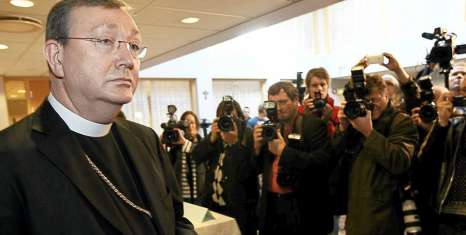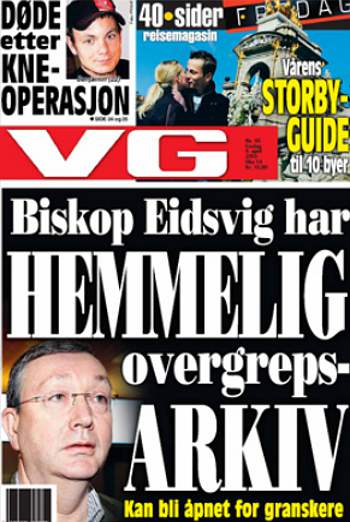Danmark ligger noen få uker før Norge mht pressens interesse for mulige sexovergep innefor Kirken. 16. mars ga biskop Kozon et intervju til Kristeligt Dagblad, der han uttalte seg ganske fornuftig, syns jeg – men det viste seg å ikke være godt nok – og bl.a. sa:
… … Hvad gør I for at hindre overgreb på børn eller hjælpe ofre for overgreb i den katolske kirke?
B: Nu har vi en beredskabsplan og en folder med oplysninger om, hvor folk kan henvende sig, hvis de har været udsat for overgreb. Her siger vi utvetydigt, at det ikke er vores ønske, at folk skal sidde inde med noget, som piner dem. Men vi kan kun lytte til dem, der måtte henvende sig.
Hvad går den beredskabsplan ud på?
B: Vi har udpeget en præst og en psykolog, som folk kan henvende sig til. De vil holde mig underrettet om, hvad de hører. Kommer der en sag, vil vi drøfte den og give den videre til et fagetisk råd bestående af en jurist og en socialrådgiver, som ikke er katolikker, og som vil rådgive os i forhold til, hvad vi videre skal gøre.
Vil I melde en præst til politiet, hvis I bliver rådet til det?
B: Nej. Det er ofrene eller ofrenes værge, der skal anmelde sager. Vi er ikke forpligtet som kirke til at anmelde, men vi vil selvfølgelig bistå ofrene i enhver form for opklaring.
Hvorfor lavede i en beredskabsplan og en folder?
B: På grund af de sager om overgreb, der har været i USA og Irland og andre steder. Vi ville gerne tilkendegive over for eventuelle ofre, at det her er noget, vi tager alvorligt, og at vi vil hjælpe dem bedst muligt.
Kan du afvise, at der finder overgreb sted i den katolske kirke i Danmark?
B: Det ved man jo aldrig, før det bliver meldt. Men jeg har ingen grund til at formode, at der foregår noget. Vi har ikke truffet særlige forholdsregler ud over at indhente lovpligtige børneattester. …
Vi har hørt om omfattende misbrug af børn i den katolske kirke i USA, Irland, Østrig, Holland og senest Tyskland. Hvorfor mener du, der er så mange sager netop i den katolske kirke?
B: Trods det tragiske i, at det foregår i den katolske kirke, skal man huske, at langt de fleste overgreb foregår i ikke-kirkeligt regi og begås af mennesker, som ikke har forpligtet sig til at leve i cølibat. Der har altid været brodne kar i alle menneskelige sammenhænge – kirkelige eller ej.
Vi skal også huske på, at det ikke er sager, som er foregået inden for de sidste 14 dage, men inden for de sidste årtier. Selvom det gør et voldsomt indtryk, så er det stadig kun en ringe del af de katolske gejstlige, der har gjort sig skyldige i misbrug. Var de her sager taget hen ad vejen, havde de stadig været beklagelige, men de ville ikke have gjort så voldsomt et indtryk. Det er en stor opsamling af sager, der skulle have været tacklet anderledes i fortiden. At det nu kommer på bordet på en gang, betyder ikke, at det kun er særligt slemt i den katolske kirke.
Men bare to dager etterpå skriver samme avis at dette budskapet er blitt svært dårlig mottatt:
… … Den katolske kirkes troværdighed i Danmark er i færd med at lide et kolossalt knæk, og skylden ligger hos kirkens overhoved, biskop Czeslaw Kozon. …
Den katolske Kirke i Danmark har blitt presset til å gå med på en ‘ufrivillig’ undersøkelseLes mer »


 VGs forside i dag er et godt eksempel på useriøs journalistikk; «den katolske biskopen har et hemmelig arkiv over sexovergripere» slås det fast – og NTB har spredt dette rundt til alle andre aviser i Norge. (Noen avsier har litt tydeligere lagt vekt på at det er et mer generelt hemmelig arkiv, heldigvis.)
VGs forside i dag er et godt eksempel på useriøs journalistikk; «den katolske biskopen har et hemmelig arkiv over sexovergripere» slås det fast – og NTB har spredt dette rundt til alle andre aviser i Norge. (Noen avsier har litt tydeligere lagt vekt på at det er et mer generelt hemmelig arkiv, heldigvis.)